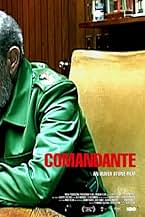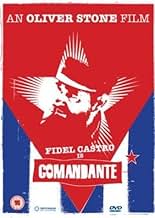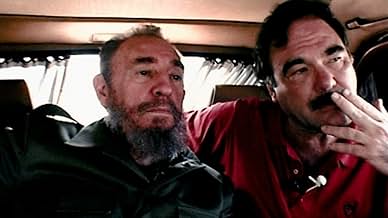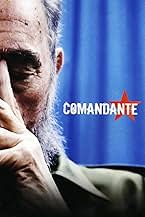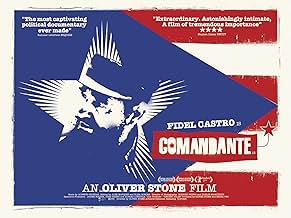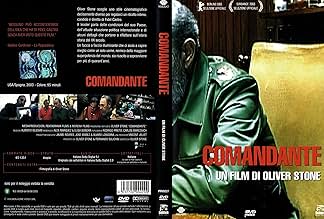Documental sobre el encuentro del director con Castro.Documental sobre el encuentro del director con Castro.Documental sobre el encuentro del director con Castro.
- Dirección
- Guionista
- Elenco
Ernesto 'Che' Guevara
- Self
- (material de archivo)
John F. Kennedy
- Self
- (material de archivo)
Richard Nixon
- Self
- (material de archivo)
Janet Reno
- Self
- (material de archivo)
Jaume Roures
- Self
- (sin créditos)
Santiago Segura
- Self
- (sin créditos)
- Dirección
- Guionista
- Todo el elenco y el equipo
- Producción, taquilla y más en IMDbPro
Opiniones destacadas
I just saw Comandante on Greek public television, in its entirety and uninterrupted and was immediately drawn to it.
Whether one agrees with Cuba's political system or not, is not the issue here. What Oliver Stone has achieved is what no journalist or historian has ever come close to. He brings himself and his crew right up close to the aged leader and confronts him relentlessly with questions from the mundane to the esoteric and from the political to the personal. Ideas about the past and the future, about dreams, art, democracy, colonialism, family, religion, women's rights, education, love etc are all exposed here, bringing out an intimate portrait. The questions are often uncomfortable as when Stone asks Castro about his ex wives in front of his wife, or when his claims about policing in Cuba are denied by one of Stone's crew members. Yet Castro even at this age, is sharp, humorous and poetic in a way that reveals the intellectual behind the politician.
It is also a travel documentary of Havana where Fidel Castro is Stone's guide and walks him through the city's monuments and cafés, sits next to him at the back seat of his car, eats and drinks with him and we get a sense that he knows what is happening in Havana's every alley.
One thing is for sure: no other country leader would ever allow himself the closeness Castro offers to Stone and expose his feelings and doubts with such spontaneity.
Stone turns a formal encounter into a family visit and brings the audience to meet an iconic political figure and spend a couple of intimate hours with him.
A work that leaves you thinking for a long while.
Whether one agrees with Cuba's political system or not, is not the issue here. What Oliver Stone has achieved is what no journalist or historian has ever come close to. He brings himself and his crew right up close to the aged leader and confronts him relentlessly with questions from the mundane to the esoteric and from the political to the personal. Ideas about the past and the future, about dreams, art, democracy, colonialism, family, religion, women's rights, education, love etc are all exposed here, bringing out an intimate portrait. The questions are often uncomfortable as when Stone asks Castro about his ex wives in front of his wife, or when his claims about policing in Cuba are denied by one of Stone's crew members. Yet Castro even at this age, is sharp, humorous and poetic in a way that reveals the intellectual behind the politician.
It is also a travel documentary of Havana where Fidel Castro is Stone's guide and walks him through the city's monuments and cafés, sits next to him at the back seat of his car, eats and drinks with him and we get a sense that he knows what is happening in Havana's every alley.
One thing is for sure: no other country leader would ever allow himself the closeness Castro offers to Stone and expose his feelings and doubts with such spontaneity.
Stone turns a formal encounter into a family visit and brings the audience to meet an iconic political figure and spend a couple of intimate hours with him.
A work that leaves you thinking for a long while.
In communism/socialism the beginning is always the End. One dictator removes another from power by force. Many praise the men that at the moment believe what they fight for some kind of change, usually when the previous government has been corrupt in some way. Corruption creates poverty and poverty leads to stress then becomes the fuel for a revolution. Most revolutions in our history have lead to totalitarianism. I like to blame that on human nature the USA is not perfect but its pretty close if you do not know what it's like to live in Cuba don't be mistaken tourist don't see the suffering especially if you have the money. Venezuela is a fresh look on early Cuba lets see how its ends up in a few years. HUGO CHAVEZ and some fanatics are beginning to dismantle any checks and balances the country may have plans on changing how long he can serve as president no limit remind you of something. Enough about that after so many years and tears and lives lost at sea. The exiled Cubans have preserved peace by leaving through 90 miles of rough seas on anything that floats not recreating another revolt adding to the cycle of bull in almost 40 odd years. Thousands of lives lost at sea as well as injustices on that prisoner island. Please think why would so many people risk their lives in such a way.
This film is a fantastic, hypnotic encounter with the legendary Marxist, world agitator and bete noire to America, Fidel Castro. It features left-wing warrior Oliver Stone's trademark flash cutting and controversial storytelling, alongside a simply stunning musical score from Alberto Iglesias. Prepare for the Buena Vista Social Club (2001) on revolutionary acid.
The beginning of Commandante yet another Oliver Stone masterpiece is similar to the beginning of his epic JFK (1991): lots of archive footage of Castro and Cuba, only this time intercut with masses of frenzied crowds drunk on revolutionary fervour, all shouting 'Fidel, Fidel', hailing their great man who is still there in this film, forty years later. Incredible.
There is both 1960s and modern footage of Havana featuring giant murals of 'Che' Guevara, Fidel ('VIVA FIDEL CASTRO') and a total absence of any corporate, Western advertising whatsoever. There is a lot of poverty, but also a series of impromptu meetings between Castro (and Stone) and various Cubans in the streets. Propaganda or planned? The movie harks back to the original revolution in 1959 and Castro's initial pro-Western peoples revolution, hailing (in English) 'representative democracy' and 'social justice'. Of course, the American corporations and political elite could never countenance any notion of true democracy just ninety miles from their corrupt lands and so the story unfolds of how various presidents tried to invade the island and destroy their path.
Fidel himself at 80 is surprisingly fit and optimistic, always in his olive green military fatigues. He appears to be a genuine messiah, despite the paradox of religion and atheistic communism in this island paradise. He wears his customary beard, is polite and genuinely sincere. Castro and Oliver Stone in a remarkably frank and candid series of interviews go on to discuss everything from politics, film, women and nationalism. Castro admires Sophia Loren, Charlie Chaplin, Khruschev, Gorbachev, Depardieu and a host of others. He has watched Titanic and Gladiator but hates Nixon who he considers the originator of the American hatred of his island yet feels sorry for Kennedy for being assassinated.
Could George W Bush even consider for one second walking the streets of his capital city? No, he would be strung up as a corrupt war criminal and stooge to all of the corporate giants that have been banished from Cuba (Texaco, Gulfoil, McDonalds, etc.).
In the original 1960s footage Castro is hailed by crowds of literally one million people. He is a strange combo of Dr Caligari, Karl Marx and the Pope.
The beginning of Commandante yet another Oliver Stone masterpiece is similar to the beginning of his epic JFK (1991): lots of archive footage of Castro and Cuba, only this time intercut with masses of frenzied crowds drunk on revolutionary fervour, all shouting 'Fidel, Fidel', hailing their great man who is still there in this film, forty years later. Incredible.
There is both 1960s and modern footage of Havana featuring giant murals of 'Che' Guevara, Fidel ('VIVA FIDEL CASTRO') and a total absence of any corporate, Western advertising whatsoever. There is a lot of poverty, but also a series of impromptu meetings between Castro (and Stone) and various Cubans in the streets. Propaganda or planned? The movie harks back to the original revolution in 1959 and Castro's initial pro-Western peoples revolution, hailing (in English) 'representative democracy' and 'social justice'. Of course, the American corporations and political elite could never countenance any notion of true democracy just ninety miles from their corrupt lands and so the story unfolds of how various presidents tried to invade the island and destroy their path.
Fidel himself at 80 is surprisingly fit and optimistic, always in his olive green military fatigues. He appears to be a genuine messiah, despite the paradox of religion and atheistic communism in this island paradise. He wears his customary beard, is polite and genuinely sincere. Castro and Oliver Stone in a remarkably frank and candid series of interviews go on to discuss everything from politics, film, women and nationalism. Castro admires Sophia Loren, Charlie Chaplin, Khruschev, Gorbachev, Depardieu and a host of others. He has watched Titanic and Gladiator but hates Nixon who he considers the originator of the American hatred of his island yet feels sorry for Kennedy for being assassinated.
Could George W Bush even consider for one second walking the streets of his capital city? No, he would be strung up as a corrupt war criminal and stooge to all of the corporate giants that have been banished from Cuba (Texaco, Gulfoil, McDonalds, etc.).
In the original 1960s footage Castro is hailed by crowds of literally one million people. He is a strange combo of Dr Caligari, Karl Marx and the Pope.
Oliver Stone, probably one of the most relevant filmmakers of the last decades in the United States, has been trying to get the American public –one of the most ignorant and alienated populations among developed countries– into alternative sides of what in the USA has been called the "official story". Comandante is not an exception in that aim, and it may approach the viewers to some topics that big media corporations and the military-industrial complex have been boycotting through the years in order to avoid the public to ask their government about some big questions. Stone's filmography evidences his own interest in the last half of the recent century –the half he was born in and the events, after WW2, that bring the United States to become what we know today–, and the plots that –in his own words– diminished individual freedom and democratic values in "the land of the free and the home of the brave!" Position for which he has often been criticized "for promoting conspiracy theories and alleged historical inaccuracies." This documentary is an important effort, now that Fidel Castro –one of the 10 most influential politicians of the last century– is probably close to the end of his life. Some analysts have said that the 20th Century will have officially ended after Castro's death.
10gavin-96
Watching recent documentaries from writers such as Michael Moore, one may be confused to what a documentary actually is. Comandante is a perfect example of what a documentary should be like. By the end of its running, the viewer has seen a balanced account with enough information either way to give food for thought.
I came away from this asking myself - 'is Castro a truly great man?', or is he 'full of ***t'?, or on the other hand has he just not practiced what he has preached?
Moore on the other hand comes from a journalistic angle, everything so over emphasised and dramatised, as if he is almost trying to convince the viewer to agree with him. He presents information through his own paradigm of the opinion he is carrying at the time.
Comandante is a mature documentary, flawless in presentation as Stones work generally is; but the key to its quality, is that it does not give you the answer. It documents the facts.
Comandante easily achieves what it sets out to do. Some viewers may expect more given the subject, but for the purist, satisfaction guaranteed.
I came away from this asking myself - 'is Castro a truly great man?', or is he 'full of ***t'?, or on the other hand has he just not practiced what he has preached?
Moore on the other hand comes from a journalistic angle, everything so over emphasised and dramatised, as if he is almost trying to convince the viewer to agree with him. He presents information through his own paradigm of the opinion he is carrying at the time.
Comandante is a mature documentary, flawless in presentation as Stones work generally is; but the key to its quality, is that it does not give you the answer. It documents the facts.
Comandante easily achieves what it sets out to do. Some viewers may expect more given the subject, but for the purist, satisfaction guaranteed.
¿Sabías que…?
- TriviaAt the beginning of the movie, when Stone and Castro are strolling through the corridors, you see Santiago Segura, dressed in white, standing in front of a group of people.
- ConexionesFeatures Vatel (2000)
- Bandas sonoras11.11
Written and Performed by Paul Kelly
Selecciones populares
Inicia sesión para calificar y agrega a la lista de videos para obtener recomendaciones personalizadas
- How long is Comandante?Con tecnología de Alexa
Detalles
- Fecha de lanzamiento
- Países de origen
- Sitio oficial
- Idiomas
- También se conoce como
- Son efsane - Comandante
- Productoras
- Ver más créditos de la compañía en IMDbPro
Taquilla
- Total a nivel mundial
- USD 135,633
- Tiempo de ejecución1 hora 39 minutos
- Color
- Mezcla de sonido
Contribuir a esta página
Sugiere una edición o agrega el contenido que falta


